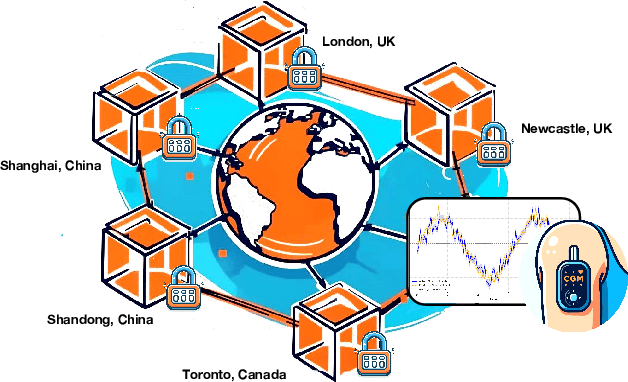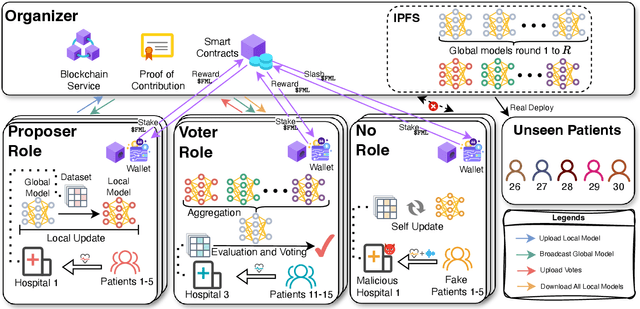Yizhe Wen
AIArena: A Blockchain-Based Decentralized AI Training Platform
Dec 19, 2024Abstract:The rapid advancement of AI has underscored critical challenges in its development and implementation, largely due to centralized control by a few major corporations. This concentration of power intensifies biases within AI models, resulting from inadequate governance and oversight mechanisms. Additionally, it limits public involvement and heightens concerns about the integrity of model generation. Such monopolistic control over data and AI outputs threatens both innovation and fair data usage, as users inadvertently contribute data that primarily benefits these corporations. In this work, we propose AIArena, a blockchain-based decentralized AI training platform designed to democratize AI development and alignment through on-chain incentive mechanisms. AIArena fosters an open and collaborative environment where participants can contribute models and computing resources. Its on-chain consensus mechanism ensures fair rewards for participants based on their contributions. We instantiate and implement AIArena on the public Base blockchain Sepolia testnet, and the evaluation results demonstrate the feasibility of AIArena in real-world applications.
Multi-Continental Healthcare Modelling Using Blockchain-Enabled Federated Learning
Oct 23, 2024



Abstract:One of the biggest challenges of building artificial intelligence (AI) model in healthcare area is the data sharing. Since healthcare data is private, sensitive, and heterogeneous, collecting sufficient data for modelling is exhausted, costly, and sometimes impossible. In this paper, we propose a framework for global healthcare modelling using datasets from multi-continents (Europe, North America and Asia) while without sharing the local datasets, and choose glucose management as a study model to verify its effectiveness. Technically, blockchain-enabled federated learning is implemented with adaption to make it meet with the privacy and safety requirements of healthcare data, meanwhile rewards honest participation and penalize malicious activities using its on-chain incentive mechanism. Experimental results show that the proposed framework is effective, efficient, and privacy preserved. Its prediction accuracy is much better than the models trained from limited personal data and is similar to, and even slightly better than, the results from a centralized dataset. This work paves the way for international collaborations on healthcare projects, where additional data is crucial for reducing bias and providing benefits to humanity.
Defending Against Malicious Behaviors in Federated Learning with Blockchain
Jul 02, 2023



Abstract:In the era of deep learning, federated learning (FL) presents a promising approach that allows multi-institutional data owners, or clients, to collaboratively train machine learning models without compromising data privacy. However, most existing FL approaches rely on a centralized server for global model aggregation, leading to a single point of failure. This makes the system vulnerable to malicious attacks when dealing with dishonest clients. In this work, we address this problem by proposing a secure and reliable FL system based on blockchain and distributed ledger technology. Our system incorporates a peer-to-peer voting mechanism and a reward-and-slash mechanism, which are powered by on-chain smart contracts, to detect and deter malicious behaviors. Both theoretical and empirical analyses are presented to demonstrate the effectiveness of the proposed approach, showing that our framework is robust against malicious client-side behaviors.
 Add to Chrome
Add to Chrome Add to Firefox
Add to Firefox Add to Edge
Add to Edge